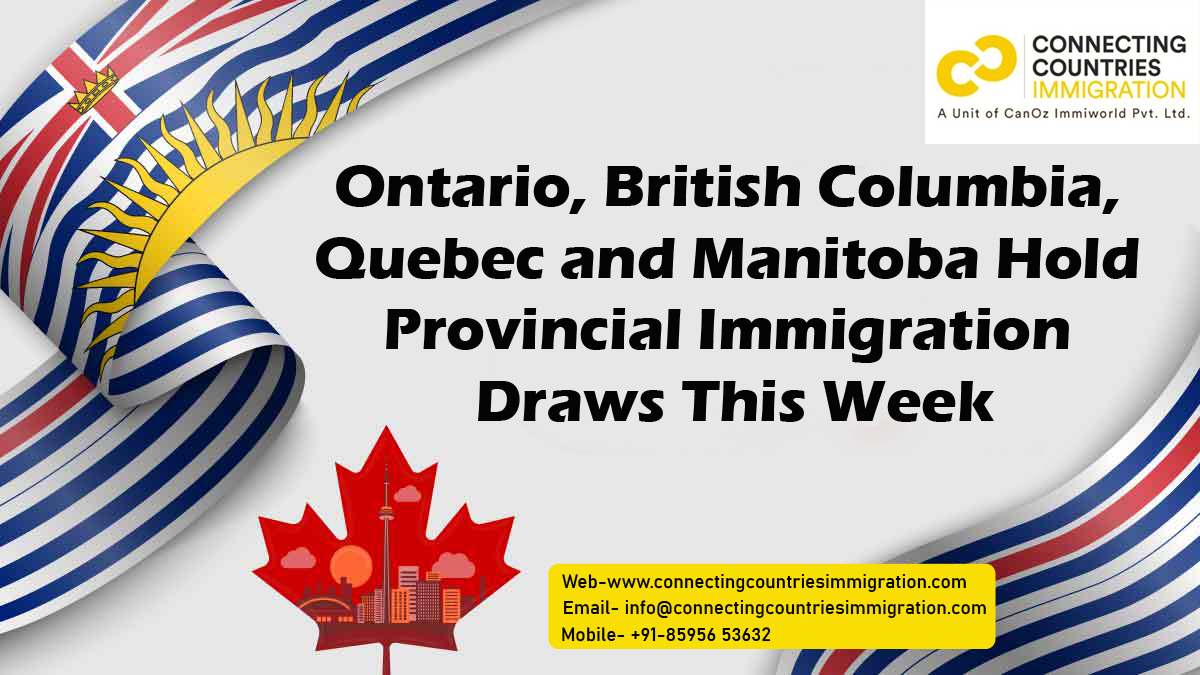Four provinces held draws this week for the Provincial Nominee Program (PNP), asking people to apply for Permanent Residence (PR) and relocate to their province. To see the complete results, continue reading.
Ontario
This week (July 25th), Ontario assisted a general draw under its French-Speaking Skilled Worker Stream, issuing 95 Notifications of Interest (NOIs)—the Ontario PNP (OINP) counterpart of an Invitation to Apply (ITA)—to candidates with CRS scores ranging from 321-374.
British Columbia
On July 25th, British Columbia staged two separate drawings for the British Columbia PNP (BCPNP) over six different streams.
Express Entry British Columbia (EEBC) Options Streams refer to PNP streams that are Express Entry aligned for the BCPNP. These are also known as enhanced nominations, and they allow individuals in the federal Express Entry pool to be nominated by a specific province to immigrate there (earning an additional 600 CRS points in the process).
The initial draw resulted in 175 ITAs being distributed in a general draw among the following streams, with associated CRS cut-off scores:
- killed Worker Stream—106 CRS cut-off;
- Skilled Worker Express Entry British Columbia (EEBC) Option Stream—106 CRS cut-off;
- International Graduate Stream—109 CRS cut-off;
- International Graduate EEBC Option Stream—109 CRS cut-off; and
- Entry Level and Semi-Skilled Stream—87 CRS cut-off.
The second draw was restricted to the Skilled Worker International Graduate Stream (which includes an EEBC option), and it targeted specific occupations:
- Childcare: Early childhood educators and assistants (NOC 42202) who had a minimum CRS score of 60 points received 30 ITAs;
- Healthcare professionals with a minimum CRS score of 60 received 30 ITAs; and
- Other priority occupations (specifically Veterinarians (NOC 31103) and Animal Health Technologists and Veterinary Technicians (NOC 32104)) with a minimum CRS score of 60 received at least four ITAs in the latest draw.
Manitoba
On July 28th, Manitoba staged three distinct draws across three different streams. These draws were for the following:
- Skilled Worker in Manitoba Stream—which issued 299 Letters of Advice to Apply (LAAs)—the Manitoba PNP (MPNP) equivalent of an ITA—to candidates with a minimum CRS score of 633;
- International Education Stream—which issued 41 LAAs to candidates of unreported minimum CRS score; and
- Skilled Worker Overseas Stream—which issued 15 LAAs to candidates who had a minimum CRS score of 726, under a Strategic Recruitment Initiative.
Of the 354 LAAs given, 56 went to candidates who declared a valid Express Entry profile, indicating that they are likely upgraded nominations.
Quebec
In addition to these findings, on July 20th, Quebec staged a draw through its distinct provincial immigration program, inviting 1633 individuals through the Arrima portal (Quebec’s own immigration portal) that:
- Had a level 7 proficiency in French according to the Québec scale of French proficiency levels for adult immigrants) or its equivalent; or
- Had a minimum CRS score equivalent or greater to 596 points; or
- Had a valid job offer outside of the Communauté métropolitaine de Montréal (the Montreal Metropolitan Area).
About the Provincial Nominee Program
The PNP was established in 1998 to share the benefits of immigration throughout Canada. While most immigrants have typically settled in one of Canada’s most populous provinces (Ontario, British Columbia, or Quebec), the PNP allows provinces to nominate persons who satisfy their labour market or demographic needs to be chosen to immigrate to their province.
With the exception of Quebec (which has its own immigration program) and Nunavut, every province in Canada operates a PNP. The PNPs have been successful in extending immigration across Canada, and they are now Canada’s principal economic immigration gateway, with over 333,000 new Canadians scheduled to arrive between 2023 and 2025.
While the majority of PNP streams are dedicated to professionals (often in specific professions), there are also PNP streams that target other types of competencies and qualifications, such as international students who have studied in that province and those with specific language abilities (usually in French).



